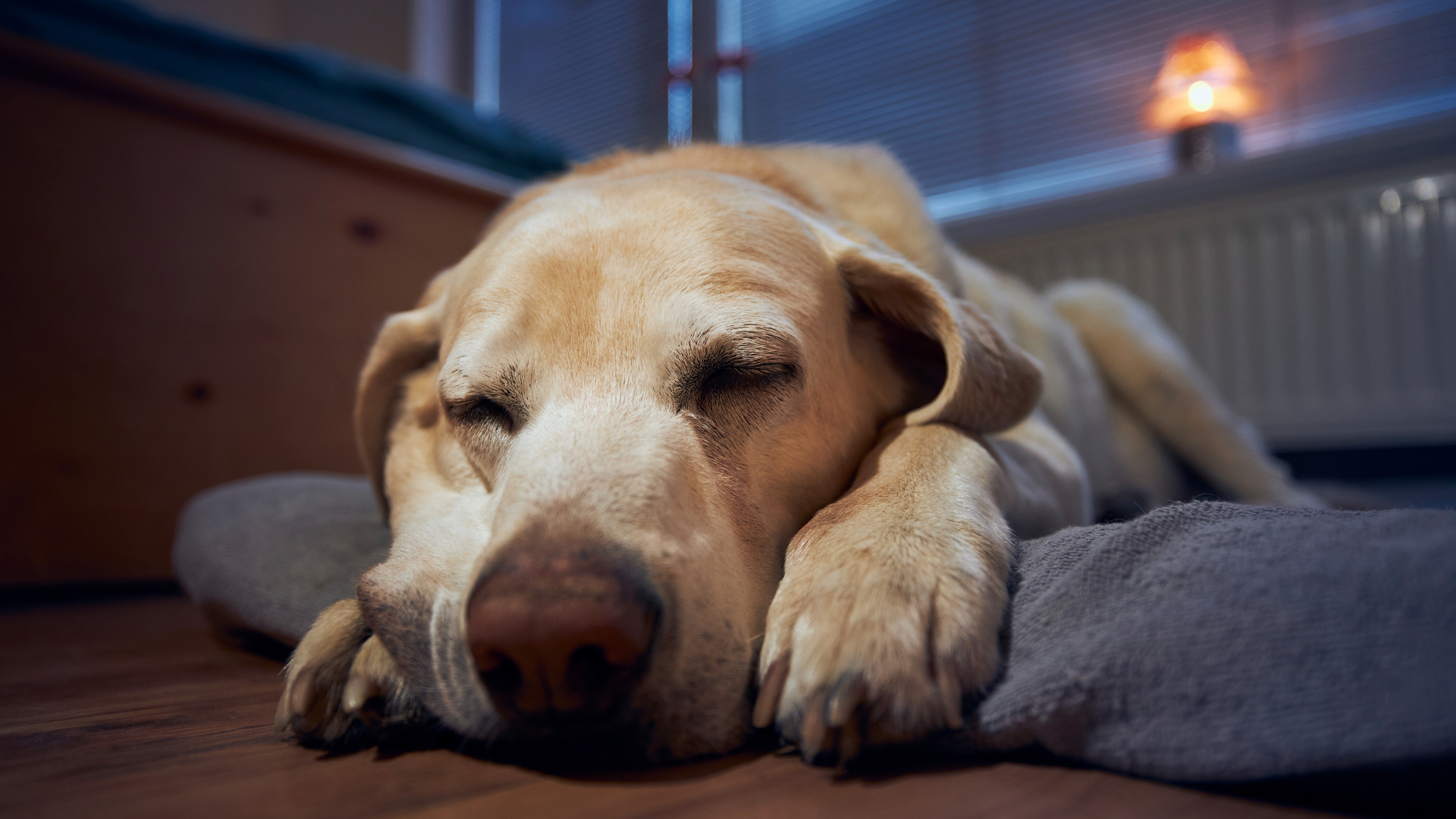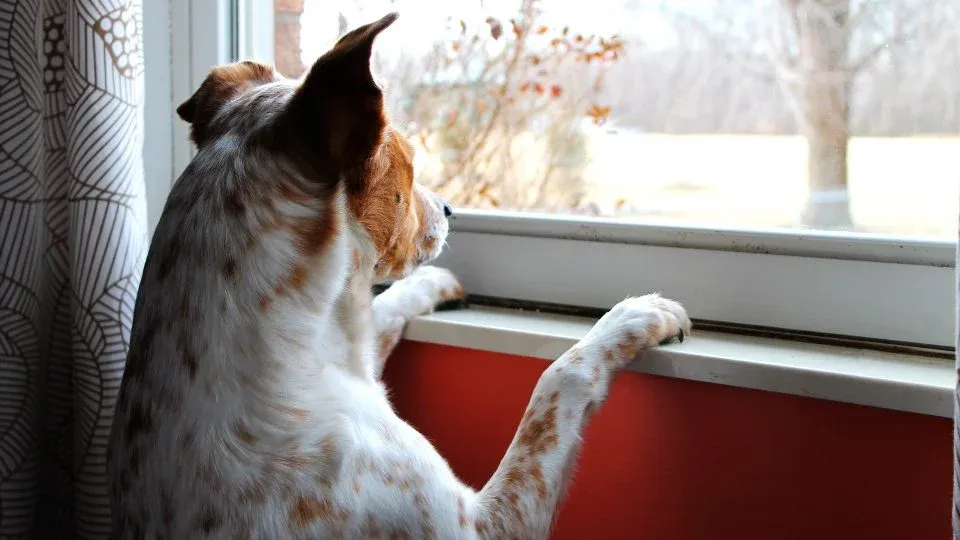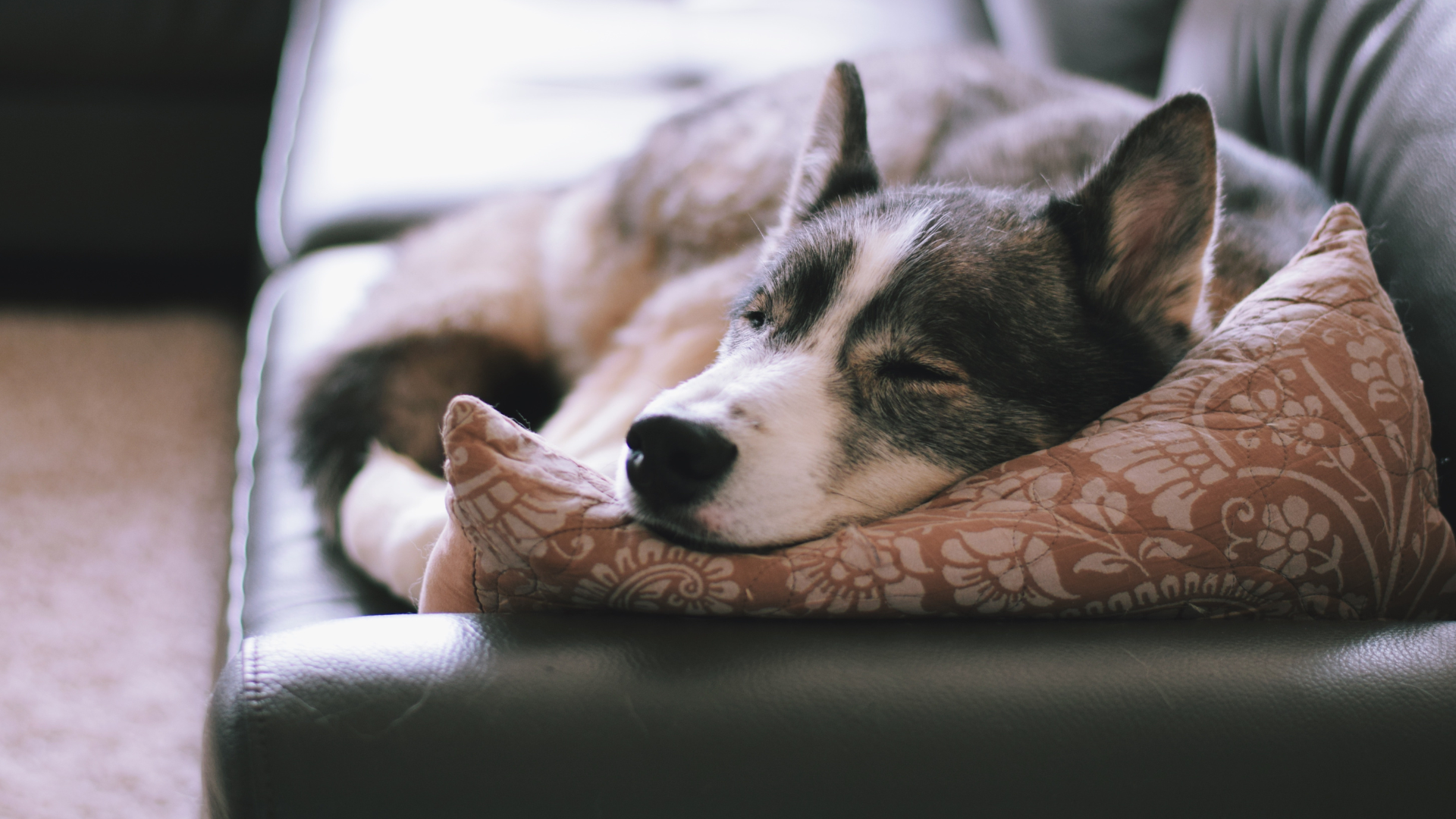Leaving a dog overnight can be a tough decision for any pet owner. Whether it's for a weekend trip or an emergency situation, leaving a furry friend behind can cause anxiety and guilt. However, sometimes it's unavoidable and necessary. So, can you leave your dog overnight?

The answer to this question depends on several factors. Firstly, it's important to consider the dog's temperament and behavior. Some dogs may become anxious or destructive when left alone, while others may be perfectly content. Additionally, the length of time the dog will be left alone should be taken into account. Leaving a dog overnight may be more manageable than leaving them alone for several days.
Another important factor to consider is the dog's living situation. If the dog is used to being indoors and sleeping in a warm bed, leaving them outside overnight may not be appropriate. Similarly, if the dog is accustomed to being around people and other pets, leaving them alone in a quiet house may be stressful. Overall, the decision to leave a dog overnight should be made based on the individual dog's needs and circumstances.
Understanding Your Dog's Needs
Dogs are social animals and thrive on human interaction and attention. Leaving your dog overnight can be stressful for both you and your furry friend. Before making the decision to leave your dog alone, it's important to understand their needs and ensure they are adequately cared for.
Feeding Requirements
Dogs have specific feeding requirements that need to be met to maintain their health and wellbeing. If you plan to leave your dog overnight, it's important to ensure they have enough food and water to last them throughout the night.
When leaving your dog alone, it's best to provide them with dry food as it won't spoil as quickly as wet food. You can also use a timed feeder to ensure your dog is fed at regular intervals.
Make sure to leave plenty of water for your dog, and consider using a water dispenser to keep it fresh and clean. It's important to note that some dogs may drink more water than usual when left alone, so make sure to leave enough for them.

Exercise and Bathroom Breaks
Dogs require regular exercise and bathroom breaks to stay healthy and avoid accidents in the house. If you plan to leave your dog overnight, it's important to ensure they have had enough exercise and have had the opportunity to go to the bathroom before you leave.
Take your dog for a long walk or play with them before leaving to tire them out and reduce their anxiety. If your dog is crate trained, make sure to leave them in their crate with enough room to move around comfortably.
If your dog is not crate trained, consider leaving them in a designated area of the house with access to water and toys. Make sure to puppy-proof the area to prevent any accidents or injuries.
Leaving your dog overnight can be a difficult decision, but with proper planning and preparation, you can ensure your dog's needs are met and they are safe and comfortable while you are away.
Preparation for Leaving Your Dog Overnight
Leaving your dog overnight can be a stressful experience for both you and your furry friend. However, with proper preparation, you can ensure that your dog is safe, comfortable, and well-cared for while you are away.
Choosing the Right Environment
When leaving your dog overnight, it is important to choose the right environment. This means selecting a place that is safe, secure, and comfortable for your dog. Some options for leaving your dog overnight include:
- Boarding kennels: These facilities provide a safe and secure environment for your dog to stay in while you are away. They typically offer a range of services, including feeding, exercise, and medical care.
- Pet sitters: A pet sitter can come to your home and care for your dog while you are away. This option is ideal for dogs who prefer to stay in their own environment.
- Friends or family: If you have friends or family members who are willing to care for your dog while you are away, this can be a good option. However, it is important to ensure that your dog is comfortable with the person who will be caring for them.

Leaving Adequate Supplies
When leaving your dog overnight, it is important to ensure that they have everything they need to be comfortable and safe. This includes:
- Food and water: Make sure that your dog has enough food and water to last for the duration of your absence. If your dog is on a special diet, make sure to provide detailed instructions for their care.
- Medications: If your dog requires medication, make sure that they have enough to last for the duration of your absence. Provide detailed instructions for administering the medication.
- Bedding: Provide your dog with a comfortable place to sleep, such as a bed or blanket.
- Toys and treats: Provide your dog with toys and treats to keep them entertained and happy while you are away.
By taking the time to prepare for your dog's overnight stay, you can ensure that they are safe, comfortable, and well-cared for while you are away.
Safety Measures
Securing Your Home
When leaving your dog overnight, it is important to ensure the safety of your home. Make sure all doors and windows are locked securely, and consider installing a security system if you don't already have one. This will not only protect your dog, but also your home and belongings.
If your dog has access to a doggy door, make sure it is locked or blocked off to prevent intruders from entering your home. It is also a good idea to remove any valuable items from plain sight, as this can deter potential burglars.
Health and Emergency Information
In case of an emergency, it is important to have all necessary information readily available. Make sure your dog's collar has identification tags with your contact information, as well as your veterinarian's information. It is also a good idea to have a current photo of your dog in case he or she gets lost.
Leave clear instructions for your dog sitter or boarding facility regarding your dog's feeding schedule, any medication needs, and any specific behaviors or preferences your dog may have. It is also important to provide emergency contact information for yourself or a trusted family member or friend.
By taking these safety measures, you can ensure the safety and well-being of your furry friend while you are away.
Comforting Your Dog Before You Leave
Leaving your dog alone overnight can be a difficult decision for many pet owners. However, there are ways to make the experience less stressful for your furry friend. Here are some tips on how to comfort your dog before you leave:
Routine and Reassurance
Dogs thrive on routine, so it's important to establish a consistent schedule before you leave. This will help your dog feel more comfortable and secure. Stick to your regular feeding, walking, and playtime routines.
It's also important to provide reassurance to your dog before you leave. Spend some quality time with your pet before you go, giving them plenty of love and attention. This will help your dog feel more relaxed and secure in your absence.
Comfort Items
Providing your dog with comfort items can also help ease their anxiety when you're away. Some items that can help include:
- A cozy bed or blanket
- Favorite toys or chew treats
- A piece of clothing with your scent on it
These items can provide comfort and familiarity to your dog, helping them feel more at ease while you're away.
Overall, taking steps to comfort your dog before you leave can help make the experience less stressful for both you and your pet. By establishing a routine, providing reassurance, and giving your dog comfort items, you can help ensure a positive experience for your furry friend.

Selecting a Caretaker
When leaving your dog overnight, it is important to select a caretaker who will provide the best care for your furry friend. There are two main options for selecting a caretaker: hiring a professional pet sitter or entrusting a trusted friend or family member.
Professional Pet Sitters
Professional pet sitters are individuals who are trained and experienced in caring for pets. They can provide a range of services, including overnight care, feeding, walking, and playtime. Hiring a professional pet sitter can provide peace of mind knowing that your dog is in the hands of a trained and reliable caretaker.
When selecting a professional pet sitter, it is important to do your research. Look for sitters who are licensed, insured, and bonded. Ask for references and read reviews from previous clients. It is also important to meet with the sitter in person to ensure that they are a good fit for your dog.
Trusted Friends or Family
If you have a trusted friend or family member who is willing and able to care for your dog overnight, this can be a great option. Your dog may already be familiar with this person, which can help reduce stress and anxiety.
When entrusting a friend or family member with the care of your dog, it is important to provide clear instructions on feeding, walking, and any other necessary care. It is also important to ensure that the caretaker is able to provide adequate supervision and attention to your dog.
Overall, whether you choose a professional pet sitter or a trusted friend or family member, selecting the right caretaker can help ensure that your dog is happy and healthy while you are away.
Monitoring Your Dog Remotely
Using Technology
With the advancement of technology, it is now possible to monitor your dog remotely. There are various devices available in the market that allow pet owners to keep an eye on their furry friends from a distance. Some of the popular options include:
- Pet Cameras: These cameras come equipped with features such as motion detection, two-way audio, and night vision. Pet owners can access the live feed from their smartphone and monitor their dog's activities.
- GPS Trackers: GPS trackers can be attached to your dog's collar and provide real-time location updates. This can be particularly useful if your dog tends to wander off or if you have hired a dog sitter who takes your dog for walks.
- Smart Collars: Smart collars come with a range of features such as activity tracking, temperature monitoring, and even health monitoring. These collars can be synced with your smartphone, and you can receive alerts if there are any changes in your dog's behavior or health.
Check-In Calls
While technology can be helpful, it is not always foolproof. It is a good idea to have a backup plan in case of any technical difficulties. One way to do this is by scheduling check-in calls with your dog sitter or a trusted friend or family member.
During these calls, you can ask about your dog's behavior, eating habits, and any other concerns you may have. This can give you peace of mind and help you identify any issues before they become serious.
Overall, monitoring your dog remotely can be a great way to keep an eye on your furry friend when you are away. However, it is important to use these tools in conjunction with other measures such as check-in calls to ensure your dog's safety and well-being.

Handling Unexpected Situations
When leaving a dog overnight, unexpected situations can arise. It is important to be prepared and have a plan in place in case of emergencies. Here are some tips for handling unexpected situations:
- Medical Emergencies: If a medical emergency occurs while the dog is being cared for overnight, the caregiver should have the contact information for the dog's veterinarian and any necessary medical records. They should also be prepared to transport the dog to the veterinarian or emergency clinic if needed.
- Behavioral Issues: If the dog exhibits unexpected or concerning behavior, the caregiver should have a plan in place for managing the situation. This may include contacting a professional dog trainer or behaviorist for advice or assistance.
- Escape Attempts: If the dog attempts to escape or succeeds in escaping, the caregiver should have a plan in place for locating and safely retrieving the dog. This may include contacting local animal control or posting flyers in the area.
By being prepared for unexpected situations, dog owners can ensure their pets are well-cared for and safe while they are away.
Returning Home
Reuniting with Your Dog
When returning home after leaving your dog overnight, it is important to give them time to adjust and settle back into their routine. Dogs may experience separation anxiety and become overly excited or anxious upon your return. To help ease this transition, it is recommended to greet your dog calmly and avoid overwhelming them with attention.
One way to ease your dog's anxiety is to establish a routine for when you return home. This can include taking your dog for a walk, playing with them, or simply spending time together. By establishing a routine, your dog will know what to expect and feel more secure when you leave in the future.
Post-Absence Care
After leaving your dog overnight, it is important to provide them with proper care upon your return. This includes ensuring they have access to fresh water, food, and a comfortable place to rest. Additionally, it is recommended to check your dog for any signs of illness or injury.
If your dog displays any unusual behaviors or symptoms, such as vomiting or lethargy, it is important to seek veterinary care immediately. It is also recommended to monitor your dog's behavior and health for several days after your return to ensure they are fully recovered from the separation.
In conclusion, returning home after leaving your dog overnight requires patience, routine, and proper care. By following these guidelines, you can help ease your dog's anxiety and ensure they receive the care they need.

Conclusion:
In conclusion, leaving your dog overnight requires careful consideration and preparation to ensure their comfort and safety. Understanding your dog's specific needs, providing adequate food, water, and comfort items, and choosing the right caretaker or environment are crucial steps.
Utilizing technology for remote monitoring and having contingency plans for unexpected situations can provide peace of mind. Upon returning, reuniting calmly and maintaining a consistent routine helps your dog readjust. By taking these measures, you can minimize anxiety and ensure your furry friend is well-cared for during your absence, making the experience less stressful for both of you.




